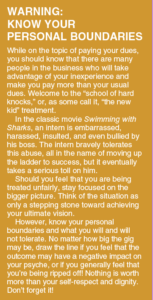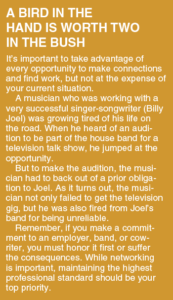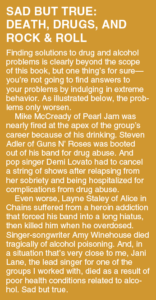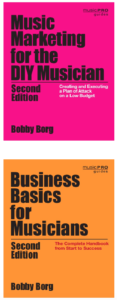Let there be no mistake—pursuing a career in the music industry in the 2020s may look easy, but it is highly competitive. The successful musicians you see today in the media—getting millions of hits on YouTube, performing in front of large audiences at the coolest music festivals, or getting streamed on popular playlists—represent only a minuscule percentage of all the musicians in, or trying to break into, the music business today. Knowing these odds, why would anyone continue to pursue a career in the music business? The love of playing music, the tools and technology of the digital age, and the success stories of hardworking artists inspire plenty of people to try. After all, why can’t you be one of the lucky ones who achieves tremendous success, or at least makes ends meet, doing what you love as an independent musician? You’re talented, you’re smart, and you’re reading this book to better understand the inner workings of the music industry. You’ve already got a lot going in your favor!
While there are no rules or set guidelines that can guarantee a prosperous and long-lasting career, I’ve outlined 15 general tips for career success—from visualizing your dreams to being proactive. Whether you are a rapper, DJ, producer, songwriter, solo artist, band, or anyone else wishing for a successful career in music, these useful tips apply to you!
Tip 1
Realize Your Dreams by Visualizing Them First
The first tip for pursuing a successful career in the music business deals with having a clear vision of what you’d like to achieve. You must see, feel, and believe in the potential outcome. If you can clearly hold a picture of success in your mind, your subconscious can bring it to pass.
In the early 1990s, in a small club called the Button South in Fort Lauderdale, FL, I witnessed an unknown artist gaze out into the audience and say, “One day I’m going to be a pop star who shocks the world.” He truly believed this. Friends tell me he even kept drawings in a notebook mapping out precisely what his success would look like. With years of hard work, and one successful album and tour after another, that artist made his vision complete.
In the best-selling book The Power of Your Subconscious Mind, author Joseph Murphy calls this the “mental-movie method.” In his words, “If I act as though I am . . . I will be.”
Tip 2
Analyze Your Career Motivations
Dovetailing nicely from tip number 1, another important tip for career success is to consider just why you are pursuing a career in the music business. Is it for the fun and crazy lifestyle it may offer? Is it for the artistic respect it may earn you among your peers? Or is it for the spiritual satisfaction it may bring, and because there is nothing else in life you would rather do? As you know, fun, artistic respect, and spirituality are not always aligned. Thus, your answers to the above questions are crucial!
By understanding your true motivations and what’s most important, you’ll stand firm about what you are (and are not) willing to give up in order to succeed. You’ll surround yourself with people who share your vision and are willing to pay allegiance to that flag. And you’ll accept the consequences of your actions and not whine and bitch about the results in the end.
Tour manager-agent-promoter Chris Arnstein calls this approach to self-awareness the “decision-making tree.” Your career decisions (or branches) should be based on the core (or root) of who you truly are as a person. Without this level of self-awareness, you can easily go astray in this business. As they say, if you don’t stand for something, you can easily fall for everything.
If you haven’t thought about your real motivation for pursuing music professionally, now is a good time to do so.
Tip 3
Develop a Realistic Outlook by Ignoring the Media Hype
You’ll enter the music business from a much stronger position if you refuse to be blinded by all of the media hype or glamour you see and hear in music videos, magazines, and news shows. The expensive houses and yachts and the carefree attitudes and overnight success stories are often spun to make it look like the music business is an easy path to the good times. The truth is that these “riches” that artists flaunt are often leased, loaned, advanced, or purchased via other businesses and investments just to help a celebrity “look the part.”
By developing a realistic outlook, you’ll be better prepared for what may lie ahead and more accepting of this wonderful and crazy business of music. You’ll understand that it could take a great deal of time and money honing your professional skills, building a fan base, and putting up with a great deal of rejection just to get ahead. But you’ll be okay with that. You’ll know deep down inside that the true talents of music lived and breathed their art with no thoughts of ever turning back, and that this determination and tenacity in regard to your craft and career is precisely what is required of you.
So get your head together! Focus on the realities of the business, not the fairy tales.
Tip 4
Be Ready to Pay Your Dues, But Use Your Head
One of those unavoidable realities of the music business is that pursuing a career will mean paying your dues.
Paying your dues essentially means paying the price for your lack of professional experience. That price is your time and hard work, which may yield little or no compensation (in other words, you work for free).
However, keep in mind that the more experience you gain, the more valuable a commodity you become. The day will arrive when you’re justly compensated—whether you are a vocalist singing background sessions, or a band paying promoters to play local clubs.
Just remember to stay focused on the bigger picture. It’s not always what you earn, but what you learn that matters. Of all the tips for career success, this ranks extremely high.
Tip 5
Expect the Worst to Happen So That the Worst Won’t Seem So Bad
At 1/3 of the way through our 15 tips, I think you’re in the right mind-set already to hear one of the toughest tips for pursuing a career in music. Ready for it? Here goes: expect the worst to happen, because it will! The good news, however, is that you can be prepared for it.
Remember the old saying, “Shit happens!” Singles get dropped from streaming playlists, bloggers write unfavorable reviews, and people will try to rip you off. Such events are an inevitable part of pursuing a career in music and an aspect that’s certainly not for the thin-skinned.
Expect to be knocked down, but learn how to get up quickly and see the lesson in every negative experience. Realize you can’t control everything that happens in this crazy business, but you can definitely control your attitude. You must focus on the positive. To survive in the biz, you must be resilient and prepared to fight forward.
As Jon Kabat-Zinn writes in his book Wherever You Go, There You Are, “You can’t stop the waves, but you can surely learn to surf.”
Tip 6
Let Go of Your Fears and Learn How to Go for It
According to Danny Sugerman and Jerry Hopkins’ book, No One Here Gets Out Alive, Jim Morrison once asked, “If your life was a movie, would anyone want to watch it?” For many artists, the answer is a flat “no.” They take a “one-foot-in/one-foot-out” approach to their careers and never dive in fully.
Jared Leto, of Thirty Seconds to Mars, pursued various opportunities in Washington, D.C.; New York; and Philadelphia before moving out West to pursue his vision as an actor and rocker. He saved a couple hundred dollars, packed a backpack, and bought a one-way ticket to Los Angeles. With an Academy Award for Best Supporting Actor and over 10 million records sold, the rest, as they say, is history.
If you have what it takes—if you’re realistic, smart, and talented—then what’s holding you back from giving your career your best shot? Is it the fear of moving to the big city, fear of rejection, or fear of going broke? Whatever it is, remember that fear is only a thought that can be replaced by more positive thoughts. As boxer Mike Tyson said during his years as the world champion, “Fear is like fire. It can either cook for you, or it can burn you. Let it cook for you.”
Look, what’s the worst that can happen, anyway? You might fall short of your dreams, but you’ll at least know that you gave your career your best shot. You’ll have no regrets! And that, my friends, is priceless! So let go of your fears and learn to go for it. You’ll be glad you did.
Tip 7
Form Solid Connections in the “Clique of the Future”
Make no mistake that networking is a vital part of establishing a successful career in the music industry. But rather than using all your energy trying to break into established and seemingly impenetrable cliques, be sure to recognize others who are talented, intelligent, and ambitious (like your fellow students or local musicians), and create your own “clique of the future.” Get in on the “ground floor” and form solid relationships that will last forever.
I got my first break recording in Jimi Hendrix’s Electric Lady Studios in New York City when two of my longtime college buddies from Berklee College of Music looked me up after graduating. As a result of getting that studio gig, I was able to move from Boston to New York City and start my career in the majors. Thanks, Nunzio and Dave!
Look, gang, a lot really does depend on whom you know—and who knows you! The majority of the work you do will be based on word-of-mouth recommendations and personal relationships you form over the years. So be sure to put yourself in situations where you can meet others who are already doing what you want to do, and who are working toward similar goals.
Great places to network and make new connections include college courses, songwriting workshops, networking groups, jam sessions, and music conventions. A few conventions worth checking out include MIDEM (midem.com), SXSW (sxsw.com), Durango Songwriters Expo (durango-songwriters-expo.com), and West Coast Songwriters (westcoastsongwriters.org/conference).
Finally, for a great read that will improve your ability to form solid relationships, check out Dale Carnegie’s best-selling book, How to Win Friends and Influence People.
Tip 8
Nurture New Opportunities While You’re Already On the Job
Yet another important tip for career success deals with “connecting the dots” and seeking out opportunity. Be clear that the best time to find work is when you’re already working.
If you’re currently an employee or a member of a band, use your situation to make new connections. People who see you perform in situations where you feel confident can help you find new opportunities down the road. My friend Mike Inez (now with Alice in Chains and Heart) originally played bass with Ozzy Osbourne when Alice in Chains was Ozzy’s opening act. He was able to connect one gig to the next and stay working for years. Remember that nurturing new career opportunities while you’re still on the job is not deceptive or dishonest; it is a must for survival. The music business is very fickle. Tours are canceled, record releases are postponed, bands are suddenly dumped, music supervisors decide not to use your songs, and producers decide not to use your beats. That’s the reality! And you must be prepared if you want to stay working.
It’s only natural for younger musicians to believe that their current musical relationships will exist indefinitely—and they very well might. However, in the words of Miyamoto Musashi in The Book of Five Rings: “The best time to prepare for adversity is when all appears calm.”
Tip 9
Climb Through Back Windows When Front Doors Aren’t Opening
If doors aren’t opening, then climb through back windows. As the old saying goes, the definition of insanity is doing the same thing over and over and expecting different results.
To demonstrate this concept, instead of trying to put your recording directly into the hands of higher-ups who are unapproachable and standoffish, get to know these people personally in more casual settings.
Jeff “Skunk” Baxter of the classic group the Doobie Brothers says, “It doesn’t matter whether you’re driving an equipment truck or sweeping studio floors; get yourself into the music business any way you can.”
You may find that working as an intern for a publishing company or writing for a local music magazine provides great opportunities to make connections. You’ll have the opportunity to get to know people more naturally than you will in situations that make you appear desperate and needy.
Look, whatever it is you’re trying to accomplish, consider a variety of approaches to achieving your goals. It’s important to be tenacious and not to abandon your initial plan of attack, but banging your head against the same stone wall is pointless.
Tip 10
Create Your Own Destiny by Being Proactive
With only 1/3 of our 15 tips left, it’s a good idea to talk about proactivity! It’s not enough to gain employment or opportunity by simply being good. You need to take control of your career and create your own destiny. Attract attention to those who can help you by first helping yourself.
Consider the following:
•If you’re a musician who wants to be known as a dynamic live player or a killer studio cat, then form your band and post videos of you performing covers on YouTube. It worked recently for Arnel Pineda, who bypassed millions and got the gig with Journey.
•If you’re a songwriter who wants to get your music placed with successful artists and in television commercials and films, then start composing for student films. It worked for indie artist Jonathan Coulton, who now works steadily.
•Finally, if you’re a solo artist or band that wants to attract a manager, or record label, or major distributor, cut and release your own record first! It worked for Macklemore and Ryan Lewis. In fact, they won four Grammy Awards.
You’ll be surprised by how many people you’ll attract in the industry once you set the wheels in motion. This is what the do-it-yourself (DIY) movement is all about. In fact, everyone from band leaders to record company A&R to publishing people expect you to have a buzz before they’ll even take a look at you. Simply put, if you don’t DIY you die. Check out my book, Music Marketing for the DIY Musician, if you want to learn more about this fascinating subject.
Tip 11
Adapt to Change by Diversifying Yourself Now
Another success tip for pursuing a long-term career in music deals with diversification. It was Charles Darwin who once said, “It is not the strongest of species that tend to survive; it is those that are most adaptable to change.” How true! It really does pay to broaden your career opportunities to increase your earning potential and “staying power” in the music business.
Dave Grohl, drummer for the grunge-rock sensation Nirvana, was able to transform his career after Kurt Cobain (Nirvana’s lead singer-songwriter) took his own life. Grohl formed a new band, the Foo Fighters, and assumed the role of vocalist, guitarist, and songwriter. The Foo Fighters entered the Billboard charts at No. 24 with their first album and have enjoyed a successful career ever since with several studio albums, a string of hits, and numerous Grammy nominations. If Dave hadn’t been prepared, he could easily have been at the end of his musical career.
So what’s your plan to diversify? Is it like independent rapper J-Riv, who operates his own production studio, entertainment company, and urban clothing retail store (6th Ave Stylez)? Whatever it is, J-Riv said it simply in an interview with Skewln Magazine, “I had to find a hustle that was legit, but at the same time relevant.” Right on, J-Riv. I couldn’t have said it better.
Tip 12
Be Practical About Money by Keeping It and Making It Grow
While on the topic of surviving for the long haul, remember that when you make money in the music business, you’ll need to learn how to save it and make it grow. There are far too many musicians who “hit the big time” only to end up penniless.
By 2006, producer Scott Storch (Beyoncé, 50 Cent, The Game) had amassed a fortune worth $70 million. As a result of living a lavish lifestyle (he maintained a $10 million home in Miami, a private jet, a 117-foot yacht, 20 luxury cars, and a cocaine habit), Storch was in dire straits by 2007. In 2009, he filed for bankruptcy. Certainly, he wasn’t watching and respecting his money, or his life. What a shame!
On the flip side, most super wealthy people, like Mark Zuckerberg, founder of Facebook, are extremely conservative. Fortune reported Zuckerberg drives a Volkswagen Hatchback. Says Zuckerberg, “The more clear I keep my life, the more time I spend thinking about how to best serve the community.”
So get smart and save and invest your money wisely! It doesn’t take much to get started, so even if you have very few funds, speak with a successful financial planner. The money you invest today could be the money you depend on tomorrow.
AFTERTHOUGHT: GOT MORE MONEY?
To learn more about money, try books like the best-selling Think and Grow Rich by Napoleon Hill, Little Book of Common Sense Investing by Jack Bogle, and The Wealthy Barber by David Chilton. Also check out magazines and newspapers like Business Week, Entrepreneur, and the Wall Street Journal.
Maintain Control in the Face of Drugs and Alcohol
Moving on to a point that may be a bit sensitive, I’ve got to bring up the issue of addiction. Drugs and alcohol are a big part of the music culture and have led to the downfall of many successful artists and bands. What might begin as casual partying can end up spiraling out of control.
Keep yourself and your band members in check before your life turns into a train wreck! If this advice means nothing to you, at least consider your professional responsibilities to the other members of your band, and to the people who have invested a lot of time and money in your career.
Also be aware that the industry is less tolerant of artists who have drug and alcohol problems than it was in the past. With other talent waiting in line to take your place, professionals simply don’t have the time to waste on your personal issues.
So, in closing, if you think that you or your bandmates are developing a serious problem with drugs or alcohol, both Alcoholics Anonymous (AA) and Narcotics Anonymous (NA) offer free meetings in a city near you. Conduct a search online today and get to a meeting. This is no joke.
Tip 14
Remember That Finding Your Passion Is a Blessing Within Itself
As we approach the end of our list, it’s a good time for a spiritual tip intended to have a profound, long-term effect on your path to success. Allow me to reflect on the gift of love, purpose, and music. I’m totally serious. Read on.
When I was very young, I knew precisely what I wanted to accomplish. I would wake each morning driven by a specific agenda—practicing, writing, promoting, etc. When I went to sleep at night, I reflected on what I had accomplished and always felt fulfilled. There has never been a wasted, sad, or lonely day in my life. I can’t imagine things being any other way.
So rejoice and feel blessed! You too have something that moves you and gives your life meaning, something that gets you up in the middle of the night with pad and paper in hand to jot down that song idea. It’s not about how much you accomplish, but the fact that you’ve found your inner self, your true purpose! Because, in the end, there’s nothing greater than that!
Hang On to the Basics
Of course, there are numerous ways to succeed and thrive in the music business. However, with the preceding tips in mind, up-and-coming artists should at least remember these important basics.
Focus on your craft first—put in your time—and be great. Write amazing songs, be amazing on stage, make fans love you and kids want to be like you, and believe in yourself for many, many, many years. Hang out and meet people—support other bands and form powerful alliances. Put your music up on the Internet and let your audience know that you exist. Give fans a reason to care.
If the heavens are all aligned, then perhaps things will happen. Till that big day, learn how to bring in income on your axe so that you at least won’t kill yourself at a random day job you hate. Know the business and don’t look for handouts (desperation is repulsive). Have a vision and a clear strategy to get there, and stay away from the haters. They are vampires and will drain your spirit. Always stay positive and never whine.
Hopefully, the rest, as they say, will be your amazing history. Peace and good luck! •
Bobby Borg is a professor of music industry studies and an author of several music industry books including Music Marketing for the DIY Musician and Business Basics for Musicians on sale at finer book sellers. Borg can be contacted via bobbyborg.com.















